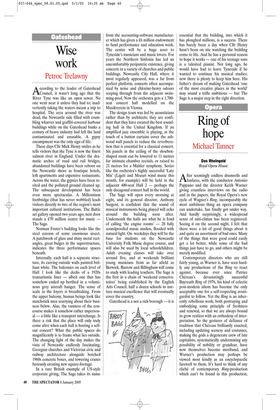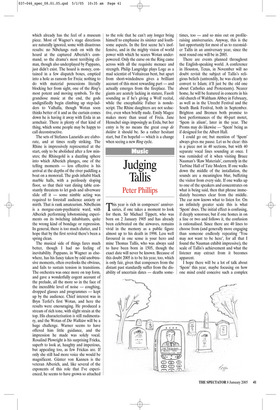Ring of hope
Michael Tanner
Das Rheingold Royal Opera House After seemingly endless drumrolls and fanfares, with the conductor Antonio Pappano and the director Keith Warner giving countless interviews on the radio and in the papers, the Royal Opera’s new cycle of Wagner’s Ring, incomparably the most ambitious thing an opera company can undertake, has finally got under way. And hardly surprisingly, a widespread sense of anti-climax has been registered. Seeing it on the second night, I felt that there were a lot of good things about it and quite an assortment of bad ones. Many of the things that were good could easily get a lot better, while some of the bad things just have to go, and others might be merely modified.
Contemporary directors who are still fairly young, as Warner is, have seen hardly any productions of the Ring to react against, because ever since Patrice Chéreau’s devastatingly successful Bayreuth Ring of 1976, his kind of eclectic post-modern idiom has become the only acceptable one for a self-respecting avantgardist to follow. Yet the Ring is an inherently rebellious work, both portraying and embodying some principle of freshness and renewal, so that we are always bound to grow restless with an orthodoxy of interpretation. So the gestures of defiance of tradition that Chéreau brilliantly enacted, including updating scenery and costumes, making the gods a degenerate crew of late capitalists, systematically undermining any possibility of nobility or grandeur, have now themselves become moribund, and Warner’s production may perhaps be viewed most kindly as an encyclopaedic farewell to them. It’s hard to think of any cliché of contemporary Ring-production which can’t be found in this production, which already has the feel of a museum piece. Most of Wagner’s stage directions are naturally ignored, some with disastrous results: no Nibelungs rush on with the hoard at the captured Alberich’s command, so the drama’s most terrifying climax, though also underplayed by Pappano, just didn’t exist. The hoard is money, contained in a few dispatch boxes, emptied into a hole as ransom for Freia; nothing to do with material possessions literally blocking her from sight, one of the Ring’s most potent and moving symbols. To the grandiose music at the end, the gods undignifiedly begin climbing up step-ladders to Valhalla, though Wotan soon thinks better of it and as the curtain comes down he is having it away with Erda in an armchair. There is plenty of that kind of thing, which some people may be happy to call deconstructive.
The sets of Stefanos Lazaridis are elaborate, and at times really striking. The Rhine is impressively represented at the start, only to be abolished after a few minutes; the Rhinegold is a dazzling sphere into which Alberich plunges, one of the telling moments — less effective is his arrival at the depths of the river paddling a boat on a monorail. The gods inhabit black marble halls, with a perilously sloping floor, so that their vast dining table constantly threatens to let gods and silverware slide off it — some nimble acting was required to forestall audience anxiety or mirth. That is rank amateurism. Nibelheim is a morgue-cum-psychiatric ward, with Alberich performing lobotomising experiments on its twitching inhabitants, quite the wrong kind of bondage or repression. In general, there is too much clutter, and I hope that by the first revival there’s been a spring clean.
The musical side of things fares much better, though I had no feeling of inevitability. Pappano, in Wagner as elsewhere, has his fancy taken by odd unobtrusive moments, often overlooks the obvious, and fails to sustain tension in transitions. The orchestra was once more on top form, and gave a wonderfully cogent account of the prelude, all the more so in the face of the incredible level of noise — coughing, dropped glasses and programmes — kept up by the audience. Chief interest was in Bryn Terfel’s first Wotan, and here the results were encouraging. He produced a stream of rich tone, with slight strain at the top. His characterisation is still rudimentary, and the Wotan of Die Walküre will be a huge challenge. Warner seems to have offered him little guidance, and the impression he made was solely vocal. Rosalind Plowright is his surprising Fricka, superb to look at, haughty and imperious, but appealing too, as few Frickas are. If only she still had more voice she would be magnificent. Günter von Kannen is the veteran Alberich, and, like several of the exponents of this role that I’ve experienced, he seems to have grown so attached to the role that he can’t any longer bring himself to emphasise its sinister and loathsome aspects. In the first scene he’s inoffensive, and in the mighty vision of world power with which he scares Wotan underpowered. Only the curse on the Ring came across with all the requisite menace and strength. Philip Langridge plays Loge as a mad scientist of Voltairean bent, but apart from short-windedness gives a brilliant account of this most rewarding part — and actually emerges from the fireplace. The giants are acutely lacking in stature, Fasolt sounding as if he’s giving a Wolf recital, while the encephalitic Fafner is nondescript. The Rhine daughters are not seductive, even when briefly nude. Emily Magee makes more than usual of Freia. Jane Henschel sings imposingly as Erda, but her entry is by no means the great coup de théâtre it should be. So a rather hesitant start, but I’m hopeful — which is a change when seeing a new Ring cycle.











































 Previous page
Previous page